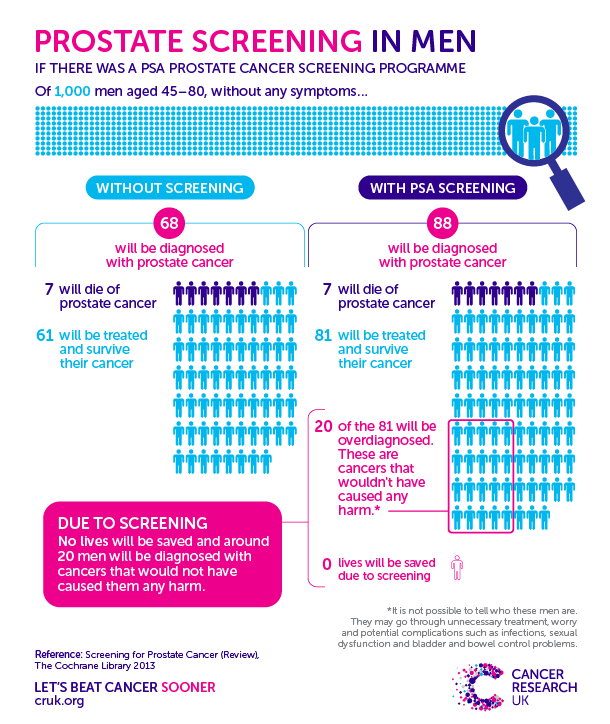Please click here for the 2022 guidance on PSA testing from Cancer Research UK.
Prostate health and PSA testing is a hot debate especially in terms of screening, which can cause of lot of anxiety to patients.
Cancer Research UK has provided a very useful and explanation tool (2018) which can be accessed by clicking here.

The below information is based on recommendations from the British Medical Journal (BMJ2014;348:2559 and BMJ 2013;346;325) GPs have received expert guidance, from the UK and the US, that they can ‘improve the health of their patients by advising them AGAINST having the PSA test’. This is because, based on research involving hundreds of thousands of people over many years, we now know that:
- The test is unlikely to prevent you dying from prostate cancer over the next 10 or 15 years or help you to live longer
- Elevated PSA levels are common and lead to additional tests which can be harmful
- PSA testing finds cancers which may never cause problems. But once these cancers are found it is hard not to treat it. These treatments can result in significant side effects such as impotence and urinary incontinence
- By choosing not to have a PSA test you can have a similar length of life and avoid the potential harms associated with tests, procedures and treatments
- For every 1,000 men who are screened with a PSA test:
- 1 death from prostate cancer will be prevented
- 100 will receive a false positive and will need prostate biopsy
- 100 will be diagnosed with prostate cancer and most likely receive potentially harmful treatment, which they may never have needed
- Biopsies and treatment are associated with significant harms
This UK view agrees with US Screening Recommendations 2012 which does not recommend screening for prostate cancer at any age as the benefits of screening for prostate cancer by measuring PSA does not outweigh harms. If despite this advice, you still want to have a PSA test then it is recommended that the test is restricted to men aged from 55 to 69, and that you make an appointment with your GP. If your PSA test is found to be low (2 or less) no further PSA testing is recommended, as your lifetime risk of developing significant prostate cancer is very low and continued testing is more likely to cause you harm. If your PSA is found to be greater than 2, you may benefit from continued screening. For more information, please click here to be directed to the NHS Decision Aid on PSA Testing.
If you are having a PSA test, there are numerous conditions which can cause a falsely high reading. We ask that patients should delay their test in the below conditions which can cause an incorrect result:
- Treated for a urine infection
- Ejaculated in the previous 48 hours prior to the test
- Vigorous exercise in the previous 48hrs prior to the test
- Had a rectal examination in the previous 1 week prior to the test
- Had a prostate biopsy in the previous 6 weeks prior to the test